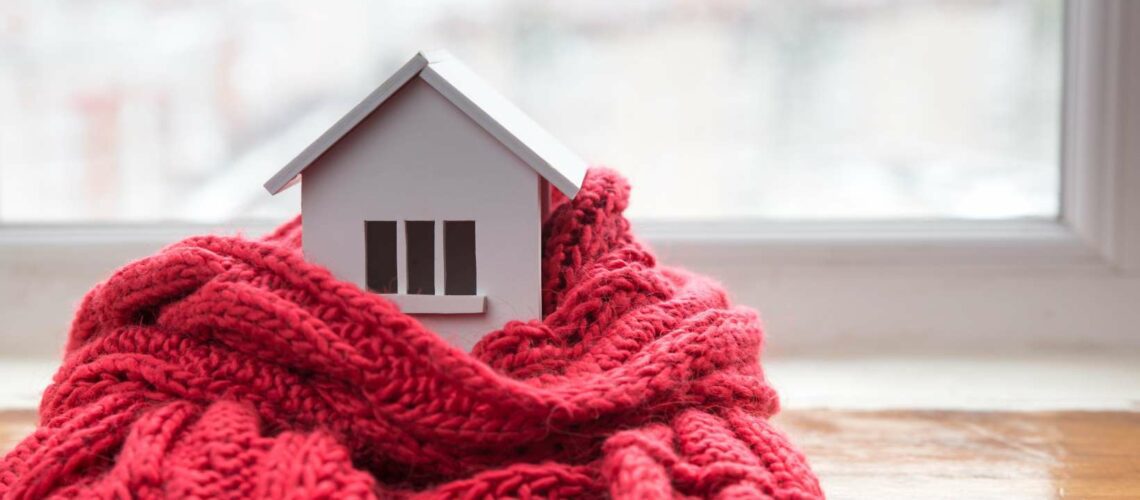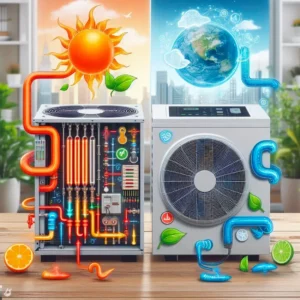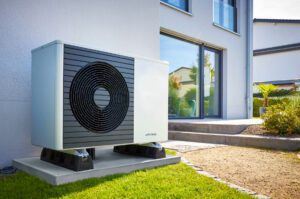As temperatures drop and winter sets in, homeowners often wonder about the efficiency and effectiveness of their heating systems. One such system, the heat pump, stands out for its ability to provide both heating and cooling. But how does a heat pump function during the harsh winter months? This is a crucial question, especially for those considering a heat pump as a sustainable and cost-effective alternative to traditional heating methods.
In this article, we’ll delve into the mechanics of Heat Pump Efficiency in Cold Weather, addressing common misconceptions and highlighting their capabilities in winter conditions.
We’ll also explore challenges that heat pumps face as temperatures plummet and how innovative solutions, such as compressor insulation jackets available at Enbi Group, can significantly enhance their performance and efficiency. Whether you’re a current heat pump owner or considering an installation, understanding these dynamics is key to optimizing your home’s warmth and comfort during the winter season.
EXPLAINING HEAT PUMP OPERATION IN COLD CLIMATE
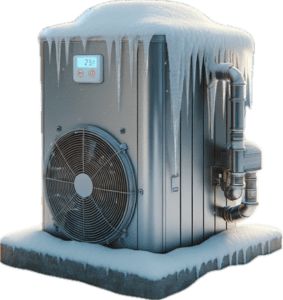
Heat pumps are renowned for their versatility in both heating and cooling homes. But their operation in winter, particularly in colder climates, is often a subject of curiosity and sometimes scepticism.
How do these systems manage to extract warmth from the chilly outdoor air and keep homes cozy?
THE BASIC PRINCIPLES
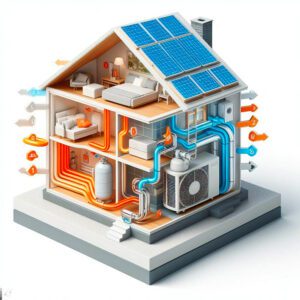
At its core, a heat pump operates on a simple principle: it transfers heat from one place to another. In winter, it extracts heat from the outside air – even in cold conditions – and transfers it indoors.
This process is facilitated by a refrigerant, which absorbs and releases heat as it circulates through the heat pump’s system.
THE HEATING CYCLE
During the heating cycle, the outdoor unit of a heat pump uses a refrigerant to absorb heat from the outside air. This refrigerant, now warm, is compressed, increasing its temperature further. It then travels to the indoor unit, where it releases this heat into your home. This cycle continues, maintaining a warm and comfortable indoor temperature, even as the outdoor temperature drops.
It’s a common misconception that heat pumps are ineffective in cold weather. Modern heat pumps are equipped with advanced technologies that allow them to operate efficiently, even in temperatures well below freezing. However, their efficiency can decrease as the temperature drops, which is where additional measures, such as insulation jackets, can play a significant role.
CHALLENGES FOR HEAT PUMPS IN WINTER
While heat pumps are efficient and effective for most of the year, winter presents unique challenges that can affect their performance. Understanding these challenges is key to maintaining efficiency and ensuring your home stays warm during the colder months.
DECREASED EFFICIENCY IN LOW TEMPERATURES
One of the primary challenges for heat pumps in winter is the drop in efficiency as the outdoor temperature falls. Heat pumps draw heat from the outside air, and as the temperature decreases, less heat is available for transfer. This means the heat pump must work harder to maintain the same level of warmth, which can lead to increased energy consumption.
THE DEFROST CYCLE
Another important aspect of heat pump operation in winter is the defrost cycle. In very cold temperatures, frost can accumulate on the outdoor unit’s coils. To maintain efficiency and proper functioning, heat pumps periodically enter a defrost mode. During this cycle, the system briefly reverses operation to melt the frost. While necessary, this process can temporarily reduce heating efficiency and increase energy use.
COPING WITH EXTREME COLD
In regions with extremely cold winters, traditional air source heat pumps may struggle to provide sufficient heat. This is where supplemental heating systems or specialized cold climate heat pumps, designed to operate in lower temperatures, become necessary. Additionally, protecting the critical components of your heat pump, such as the compressor, becomes crucial in these conditions.
These challenges highlight the importance of not only choosing the right type of heat pump for your climate but also taking steps to maximize its efficiency. In the following section, we will explore how insulation, specifically compressor insulation jackets like those offered by Enbi Group, can enhance the performance and reliability of heat pumps in winter conditions.
MAXIMIZING HEAT PUMP EFFICIENCY IN WINTER
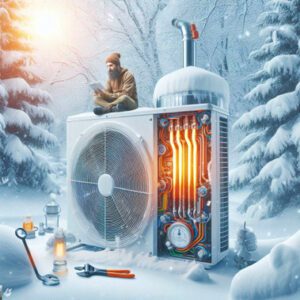
To address the challenges faced by heat pumps in colder climates, homeowners can take proactive measures. One such measure is enhancing the system’s insulation, particularly around the compressor, to optimize performance and efficiency.
THE IMPORTANCE OF INSULATION
Insulation plays a crucial role in maintaining the efficiency of heat pumps during winter. It helps to protect the system’s compressor from extreme temperatures, reducing the risk of mechanical strain and energy loss. Insulating the compressor can also help in minimizing the frequency and duration of the defrost cycle, thereby maintaining a more consistent heat output.
COMPRESSOR INSULATION JACKETS
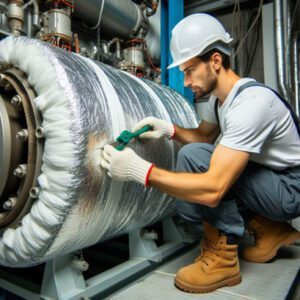
A practical solution for insulation is the use of compressor insulation jackets. These jackets are specifically designed to fit around the compressor unit, providing an extra layer of protection against the cold. By keeping the compressor at a more stable temperature, these jackets help in ensuring that the heat pump operates more efficiently, even in lower temperatures.
For instance, the compressor insulation jackets available at Enbi Group are tailored to enhance heat pump performance. These jackets are made from high-quality materials that withstand harsh weather conditions, offering durability and reliability. By reducing thermal stress on the compressor, they extend the life of your heat pump and contribute to overall energy savings.
OTHER EFFICIENCY ENHANCING MEASURES
In addition to insulation, other steps can be taken to maximize heat pump efficiency in winter. These include regular maintenance checks, proper thermostat settings, and ensuring that the outdoor unit is clear of snow and ice. Each of these measures contributes to the optimal performance of your heat pump throughout the winter months.
CASE STUDIES AND REAL WORLD APPLICATIONS
To illustrate the impact of proper insulation and maintenance on heat pump performance in winter, let’s explore some real-world examples and case studies. These stories not only demonstrate the practical benefits but also provide insights into how homeowners can optimize their systems.
Success Story: Enhanced Efficiency in a Residential Setting
In a suburban neighborhood, a family noticed a significant drop in their heat pump’s efficiency during the winter months. After installing a compressor insulation jacket from Enbi Group, they observed a notable improvement. The insulation helped maintain a consistent temperature in the compressor, reducing the strain on the system and lowering their energy bills. This case highlights the direct benefits of adding insulation to enhance heat pump performance in colder climates.
COMMERCIAL APPLICATION: MAINTAINING CONSISTENT HEATING IN AN OFFICE BUILDING
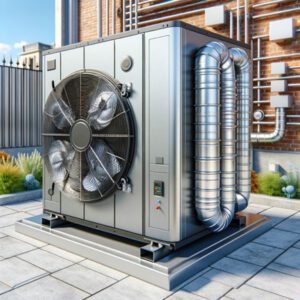
A large office building, equipped with a state-of-the-art heat pump system, faced challenges in maintaining a comfortable temperature during a particularly harsh winter. The installation of compressor insulation jackets resulted in a more stable and efficient heating system. Employees reported a more comfortable working environment, and the building management recorded lower energy costs, showcasing the effectiveness of insulation in commercial settings.
COMPARATIVE STUDY: INSULATED VERSUS NON-INSULATED SYSTEMS
A comparative study conducted in a region with cold winters examined two similar homes, one with an insulated heat pump compressor and the other without. The home with the insulated compressor experienced fewer defrost cycles, maintained a more consistent indoor temperature, and had lower overall heating costs. This study provides concrete evidence of the advantages of insulation in enhancing the efficiency and reliability of heat pumps in winter.
These examples underscore the importance of considering not just the type of heat pump system you install, but also the additional steps you can take to ensure its optimal performance. In the following section, we will offer best practices for heat pump maintenance in winter, ensuring your system remains efficient and effective throughout the colder months.
BEST PRACTICES FOR HEAT PUMP MAINTENANCE IN WINTER
Proper maintenance is crucial for ensuring the efficiency and longevity of your heat pump, especially during the winter months. Here are some best practices to keep your heat pump running optimally in cold weather.
Regular Maintenance Checks
- Professional Inspections: Schedule annual inspections with a qualified technician. They can check the system’s components, ensuring everything is in good working order and making necessary adjustments.
- Filter Maintenance: Regularly clean or replace the air filters. A clogged filter can hinder airflow and reduce system efficiency.
- System Calibration: Ensure that your system is properly calibrated. This includes checking the thermostat settings and ensuring the system cycles correctly.
Optimizing Thermostat Settings
- Consistent Temperature: Avoid setting the thermostat back significantly at night. Heat pumps work best when maintaining a relatively constant temperature.
- Smart Thermostats: Consider using a smart thermostat for better temperature management and energy savings.
Clearing Snow and Ice
- Outdoor Unit Maintenance: Regularly clear snow and ice from around the outdoor unit. Blocked airflow can significantly decrease efficiency and lead to system damage.
Utilizing Insulation Jackets
- Protecting the Compressor: As previously mentioned, using compressor insulation jackets, like those from Enbi Group, can protect the compressor from extreme temperatures, enhancing overall system efficiency.
Monitoring System Performance
- Energy Usage Tracking: Keep an eye on your energy usage. A sudden increase can indicate a problem with your heat pump.
- Listening for Unusual Noises: Be attentive to any strange sounds from your system, as these can be early indicators of issues needing attention.
By following these maintenance practices, you can help ensure that your heat pump operates efficiently and effectively throughout the winter months, providing comfortable and cost-effective heating for your home.
In our concluding section, we will summarize the key points discussed in this article and reiterate the importance of proper heat pump maintenance and insulation for optimal winter performance.
CONCLUSION
As we’ve explored throughout this article, heat pumps are a viable and efficient solution for heating homes, even in the colder months of winter. However, their performance is heavily influenced by external temperatures and how well they are maintained and insulated.
Key Takeaways
- Efficiency in Cold Weather: Modern heat pumps are designed to operate effectively in cold climates, but their efficiency can decrease as temperatures drop.
- Overcoming Challenges: Proper insulation, particularly around the compressor, can significantly enhance a heat pump’s performance in winter. Products like the compressor insulation jackets from Enbi Group are specifically designed to address this need.
- Maintenance is Crucial: Regular checks, appropriate thermostat settings, and keeping the outdoor unit clear of snow and ice are essential for optimal performance.
The Role of Insulation
As we’ve seen in the case studies and real-world applications, the addition of insulation, especially around critical components like the compressor, can make a substantial difference. Not only does it improve efficiency and reduce energy costs, but it also extends the lifespan of the heat pump by reducing wear and tear.
Final Thoughts
Choosing and maintaining a heat pump for winter use requires consideration and care. With the right practices, including the use of quality insulation jackets, your heat pump can be an effective, eco-friendly, and cost-efficient heating solution for your home.
For more information about enhancing your heat pump’s performance and to explore our range of compressor insulation jackets, visit Enbi Group’s product page. Equip your heat pump to tackle the winter effectively and efficiently.

